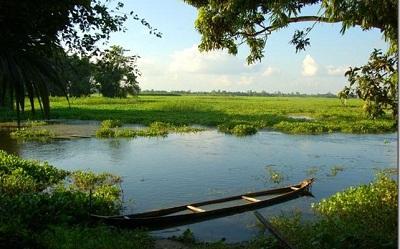The 2nd of February is World Wetlands Day and marks the day of adoption of the historic Convention on Wetlands in 1971. Also known as the Ramsar Convention, after the Iranian city where it was inked, the intergovernmental treaty provides a framework for international cooperation for the conservation and wise use of wetlands and their resources.
The Ramsar Convention definition of wetlands includes lakes, rivers, underground aquifers, swamps, marshes, peatlands, deltas, tidal flats, mangroves, coastal areas, coral reefs, and manmade ponds, reservoirs, salt pans, etc. Wetlands provide globally significant social, economic and environmental benefits. Important wetland functions include water storage, groundwater recharge, storm protection, flood mitigation, shoreline stabilization, erosion control, and retention of carbon, nutrients, sediments and pollutants (Dugan 1990). Wetlands also produce goods that have a significant economic value such as clean water, fisheries, timber, peat, wildlife resources and tourism opportunities.
Wetlands sustain lives and are among the most diverse ecosystems and supply all our fresh water. Yet wetlands around the world continue to be degraded and converted for development needs leading to the disappearance of least 64% of wetlands around the world since 1900. Wetlands hold significant carbon stores and their conservation is a vital part of climate change mitigation strategies. Recent scientific advances have demonstrated that coastal wetlands are incredible long-term carbon sinks, storing carbon in the plants and in the soils below for hundreds to thousands of years.
The theme for World Wetlands Day 2017 is ‘Wetlands for Disaster Risk Reduction’ and is meant to raise awareness and highlight the role of these wetlands in reducing the impacts of floods, droughts and cyclones on communities and resilience for faster recovery. Wetlands are important regulators of water quantity and water quality. Several types of wetlands are known to act as hydrological buffers. For example, floodplain wetlands store water when rivers over-top their banks, reducing flood risk downstream.
Human interventions lead to degradation of wetlands and aggravate the impacts of natural disasters; for example, building canals and reducing drainage worsens flash flood conditions by reducing the natural floodplain sponge effect. Similarly, replacing mangroves with fisheries and salt pans removes the natural coastline buffer and increases carbon emissions. The burning of peatlands is also connected to massive emissions of carbon dioxide into the atmosphere. Wetlands are often drained for agriculture leading to the removal of the natural sink to prevent flooding.
The United Nations estimates that 90% of all natural hazards are water-related and as per the Intergovernmental Panel on Climate Change, such incidents are set to increase. In less than four decades, the frequency of disasters has more than doubled across the globe, mostly driven by climate change. Nearly one and a half million people were killed in natural disasters in the last decade alone, with 90% of casualties concentrated in the low and middle income countries.
Wetlands act as a natural protective buffer along the coastline and are a natural sink for excess rainfall in inland areas, thereby reducing flooding. The natural release of stored water during the dry season delays the onset of droughts and water shortages. Salt-water tolerant mangroves have strong roots and considerably blunt the impact of cyclones and tsunamis. Mangroves also store carbon dioxide, helping to fight climate change. Coral reefs are home to a quarter of all marine species and also act as offshore wave barriers. Similarly, floodplains and peatlands play an important role in mitigating effects of climate change and provide a safe haven to millions of birds and animals.
Wetlands are also vital for communities to be resilient; designated protected wetland areas have been used to strengthen nature’s own buffer. The IUCN is working with local communities in Senegal to restore degraded wetlands and to encourage sustainable agriculture, tourism and fishing practices. Scientists worldwide are looking at the ecological and hydrological impacts resulting from climate change. Wetlands are vulnerable to climate change with variability in responses and human interventions for restoration dependent on habitat.
Healthy wetlands can absorb some of the impacts of extreme weather events, cushioning the damage in local communities; the wetland ecosystem helped speed up the recovery process after the 1999 cyclone in Odisha, acting as natural water filters and nutrient restorers. Local communities and indigenous people understand the role of our wetland in disaster risk reduction. Therefore, harnessing the traditional knowledge of these communities can contribute significantly to disaster risk reduction.
- 13776 reads










Add new comment